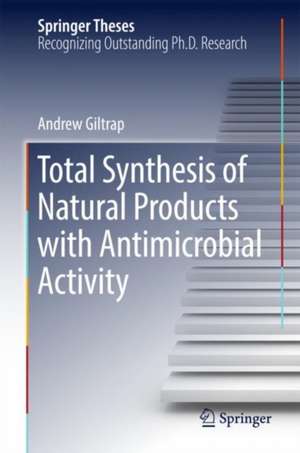Total Synthesis of Natural Products with Antimicrobial Activity: Springer Theses
Autor Andrew Giltrapen Limba Engleză Hardback – 14 mai 2018
| Toate formatele și edițiile | Preț | Express |
|---|---|---|
| Paperback (1) | 781.00 lei 43-57 zile | |
| Springer Nature Singapore – 14 feb 2019 | 781.00 lei 43-57 zile | |
| Hardback (1) | 787.15 lei 43-57 zile | |
| Springer Nature Singapore – 14 mai 2018 | 787.15 lei 43-57 zile |
Din seria Springer Theses
- 18%
 Preț: 997.88 lei
Preț: 997.88 lei -
 Preț: 389.88 lei
Preț: 389.88 lei - 15%
 Preț: 646.94 lei
Preț: 646.94 lei - 18%
 Preț: 943.43 lei
Preț: 943.43 lei -
 Preț: 399.29 lei
Preț: 399.29 lei - 18%
 Preț: 944.99 lei
Preț: 944.99 lei - 15%
 Preț: 636.80 lei
Preț: 636.80 lei - 18%
 Preț: 941.05 lei
Preț: 941.05 lei - 15%
 Preț: 643.16 lei
Preț: 643.16 lei - 15%
 Preț: 642.68 lei
Preț: 642.68 lei - 18%
 Preț: 1103.62 lei
Preț: 1103.62 lei - 20%
 Preț: 558.82 lei
Preț: 558.82 lei - 18%
 Preț: 1112.30 lei
Preț: 1112.30 lei - 18%
 Preț: 944.19 lei
Preț: 944.19 lei - 18%
 Preț: 1109.92 lei
Preț: 1109.92 lei - 18%
 Preț: 1217.27 lei
Preț: 1217.27 lei - 15%
 Preț: 640.06 lei
Preț: 640.06 lei - 15%
 Preț: 636.45 lei
Preț: 636.45 lei - 15%
 Preț: 640.06 lei
Preț: 640.06 lei - 15%
 Preț: 640.88 lei
Preț: 640.88 lei -
 Preț: 389.70 lei
Preț: 389.70 lei - 20%
 Preț: 563.89 lei
Preț: 563.89 lei -
 Preț: 393.35 lei
Preț: 393.35 lei - 15%
 Preț: 637.93 lei
Preț: 637.93 lei - 15%
 Preț: 641.85 lei
Preț: 641.85 lei - 18%
 Preț: 1225.94 lei
Preț: 1225.94 lei - 20%
 Preț: 551.36 lei
Preț: 551.36 lei - 18%
 Preț: 1229.10 lei
Preț: 1229.10 lei - 15%
 Preț: 639.25 lei
Preț: 639.25 lei - 18%
 Preț: 999.45 lei
Preț: 999.45 lei - 15%
 Preț: 640.06 lei
Preț: 640.06 lei - 18%
 Preț: 1220.45 lei
Preț: 1220.45 lei - 18%
 Preț: 1116.26 lei
Preț: 1116.26 lei - 18%
 Preț: 1110.72 lei
Preț: 1110.72 lei - 18%
 Preț: 1000.87 lei
Preț: 1000.87 lei - 18%
 Preț: 891.17 lei
Preț: 891.17 lei - 15%
 Preț: 640.06 lei
Preț: 640.06 lei - 5%
 Preț: 1154.07 lei
Preț: 1154.07 lei - 15%
 Preț: 635.96 lei
Preț: 635.96 lei - 15%
 Preț: 640.88 lei
Preț: 640.88 lei -
 Preț: 387.20 lei
Preț: 387.20 lei - 18%
 Preț: 1109.92 lei
Preț: 1109.92 lei -
 Preț: 385.25 lei
Preț: 385.25 lei -
 Preț: 385.25 lei
Preț: 385.25 lei - 18%
 Preț: 1112.30 lei
Preț: 1112.30 lei - 18%
 Preț: 999.45 lei
Preț: 999.45 lei -
 Preț: 386.99 lei
Preț: 386.99 lei - 15%
 Preț: 637.13 lei
Preț: 637.13 lei - 20%
 Preț: 554.20 lei
Preț: 554.20 lei - 20%
 Preț: 555.57 lei
Preț: 555.57 lei
Preț: 787.15 lei
Preț vechi: 959.94 lei
-18% Nou
Puncte Express: 1181
Preț estimativ în valută:
150.62€ • 157.66$ • 125.36£
150.62€ • 157.66$ • 125.36£
Carte tipărită la comandă
Livrare economică 31 martie-14 aprilie
Preluare comenzi: 021 569.72.76
Specificații
ISBN-13: 9789811088056
ISBN-10: 9811088055
Pagini: 304
Ilustrații: XXIV, 268 p. 144 illus., 59 illus. in color.
Dimensiuni: 155 x 235 mm
Greutate: 0.59 kg
Ediția:1st ed. 2018
Editura: Springer Nature Singapore
Colecția Springer
Seria Springer Theses
Locul publicării:Singapore, Singapore
ISBN-10: 9811088055
Pagini: 304
Ilustrații: XXIV, 268 p. 144 illus., 59 illus. in color.
Dimensiuni: 155 x 235 mm
Greutate: 0.59 kg
Ediția:1st ed. 2018
Editura: Springer Nature Singapore
Colecția Springer
Seria Springer Theses
Locul publicării:Singapore, Singapore
Cuprins
Introduction.- Total Synthesis of Teixobactin.- Synthesis of Deshydroxy Skyllamycins A-C.- Total Synthesis of Skyllamycins A-C.- Experimental.
Notă biografică
Andrew M. Giltrap was raised in Sydney, Australia and carried out his Bachelor of Science majoring in chemistry at the University of Sydney. During this time, Andrew undertook his final year undergraduate research project under the supervision of Professor Richard J. Payne, receiving the University Medal for undergraduate excellence. Andrew continued in the laboratory of Professor Payne, commencing his PhD studies in 2013 funded by an Australian Postgraduate Award, the Sydney University Vice-Chancellor’s Research Scholarship and the John A. Lamberton Scholarship. During his PhD, Andrew’s research focused on the total synthesis of antimicrobial peptide natural products, notably completing the first total syntheses of teixobactin and skyllamycins A-C. He is currently a postdoctoral research associate at the University of Sydney.
Textul de pe ultima copertă
This thesis focuses on the development of efficient and scalable total syntheses of natural products that can be used as preferred scaffolds for anti-infective drug discovery. It describes the total synthesis of two classes of antimicrobial non-ribosomal peptides (NRPs) – teixobactin and the skyllamycins – with subsequent biological evaluation. The first part describes the first total synthesis of teixobactin by means of a solid-phase peptide synthesis-macrolactamisation approach, yielding a synthetic natural product that can combat a number of clinically relevant Gram-positive bacterial pathogens. The second part describes the first total synthesis of skyllamycins A-C, a family of structurally complex cyclic NRPs, which inhibit the growth of the Pseudomonas aeruginosa biofilms that are responsible for significant mortality among cystic fibrosis patients.
Caracteristici
Focuses on the development of efficient and scalable total syntheses of natural products that can be used as preferred scaffolds for anti-infective drug discovery Describes the total synthesis of two antimicrobial non-ribosomal peptides (NRPs) classes: teixobactin and skyllamycins Demonstrates how synthetic NRPs’ natural products can be used to inhibit the growth of biofilms and combat bacterial pathogens
